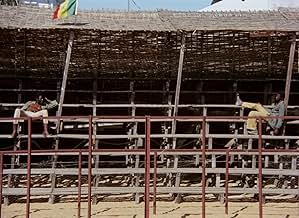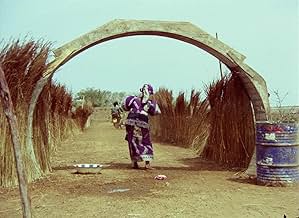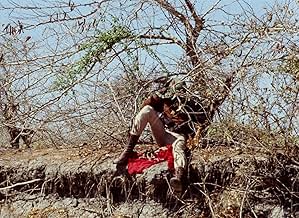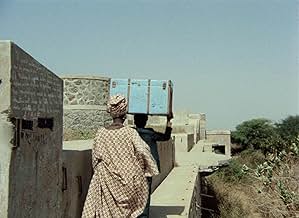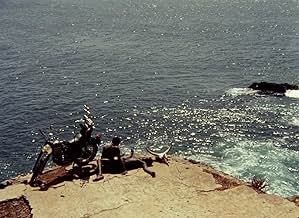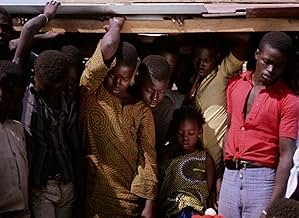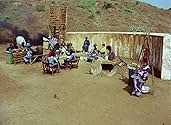AVALIAÇÃO DA IMDb
7,0/10
4,4 mil
SUA AVALIAÇÃO
Mory, um vaqueiro, e Anta, uma estudante universitária, tentam ganhar dinheiro para ir a Paris e deixar seu passado chato atrás.Mory, um vaqueiro, e Anta, uma estudante universitária, tentam ganhar dinheiro para ir a Paris e deixar seu passado chato atrás.Mory, um vaqueiro, e Anta, uma estudante universitária, tentam ganhar dinheiro para ir a Paris e deixar seu passado chato atrás.
- Direção
- Roteirista
- Artistas
- Prêmios
- 2 vitórias e 1 indicação no total
Myriam Niang
- Anta
- (as Mareme Niang)
Josephine Baker
- Joséphine Baker
- (narração)
- (as Joséphine Baker)
Avaliações em destaque
I recently showed this film to a group of students so what follows is a condensed version of the worksheet I gave them. The questions I give hopefully can assist others in making meaning from the film.
Touki Bouki can best be made sense of in the following way: It operates through allusion and symbolism. Through the story of two young lovers, Mory and Fanta, clashing with the older generation, yearning to leave for Paris, Mambety puts on screen his vision of a country where the weight of thousands of years of tradition collides head on with the modernity of a newly emergent Senegal.
Allusion...an implied or indirect reference hinting at something
Symbol...something that stands for something else...something concrete that represents or suggests another thing that cannot in itself be represented or visualised...for example a lion symbolises courage
Think about what you have seen (and heard!) in the film, paying special attention to:
Mory's motorbike – what is it decorated with? What do those objects remind you of? Fanta ties it to a tree, in the midst of a herd of cows...is there a connection to the cows?
The long scene in the first half of the film, when there are lots of shots of the sea, then we see Mory and Fanta together on the cliffs talking about leaving for France
The transformation of the Aunt from an unsympathetic character in the first half of the film to a praise singer in the second.
Charlie's car which Mory and Fanta ride off in after robbing him is a Citroen painted in the flag of which country? How is it positioned in relation to the motorbike and the welcomers?
1. How do you think the following things are alluded to in the film?
The act of lovemaking The city of Paris The cycles of life – birth, death, birth
2. How do you think the following things are symbolised in the film?
African tradition African modernity – this film is made soon after Senegal gained independence The ties which hold us, such as family, friends, our familiar environment Colonial power The primitive
Other points to consider...
Mambety inserts documentary footage from actual events, such as the women at the well, a wrestling competition, street children and a Presidential motorcade, into a fiction film. Do these scenes have anything to do with the story? What effect do they have on you, the viewer? What's your response to them? Why might they be in the film?
Certain images and sounds are repeated in the film, such as the ocean, the crows, the cries of the taxi driver who runs away from the box then repeated by the caveman. What effect does this have? Does it 'organize' the film in any way?
Answers... Mory's motorbike symbolizes Africa, in the scene after they ve robbed Charlie, it s positioned in such a way against the Citroen that the two seem oppositional. The Citroen is a French car decorated with the US flag stars and stripes so representing both French colonialism and US imperialism. The sea is a symbol for lovemaking. The cycles of nature are implied in the scenes of cattle slaughter and goat being sacrificed. Fanta ties the motorbike up as if shes trying to hold at bay the forces of modernity, of change. is the film trying to reconcile two opposing aspects, yearning for the past and tradition while simultaneously embracing modernity, the new? Whose the weird, white looking caveman up in the tree? Its as if Mambety shoves our images of 'primitive' Africans back in faces, also in the dream sequence when Mory and Fanta sit in the car, dressed in 1930s clothes smoking, being sung praises by Aminata Fal is a parody of successful Europeans. There's so much I d love to write about this film...Paris is reduced to a notion, an idea, a fantasy, brought to life through a clichéd song by Josephine Baker. On another level I read Touki Bouki as being about how Europe positions Africa and Africa positions Europe as exotic other. I m running out of space here, loads I could write about this film, hope this is useful, ENJOY!
Touki Bouki can best be made sense of in the following way: It operates through allusion and symbolism. Through the story of two young lovers, Mory and Fanta, clashing with the older generation, yearning to leave for Paris, Mambety puts on screen his vision of a country where the weight of thousands of years of tradition collides head on with the modernity of a newly emergent Senegal.
Allusion...an implied or indirect reference hinting at something
Symbol...something that stands for something else...something concrete that represents or suggests another thing that cannot in itself be represented or visualised...for example a lion symbolises courage
Think about what you have seen (and heard!) in the film, paying special attention to:
Mory's motorbike – what is it decorated with? What do those objects remind you of? Fanta ties it to a tree, in the midst of a herd of cows...is there a connection to the cows?
The long scene in the first half of the film, when there are lots of shots of the sea, then we see Mory and Fanta together on the cliffs talking about leaving for France
The transformation of the Aunt from an unsympathetic character in the first half of the film to a praise singer in the second.
Charlie's car which Mory and Fanta ride off in after robbing him is a Citroen painted in the flag of which country? How is it positioned in relation to the motorbike and the welcomers?
1. How do you think the following things are alluded to in the film?
The act of lovemaking The city of Paris The cycles of life – birth, death, birth
2. How do you think the following things are symbolised in the film?
African tradition African modernity – this film is made soon after Senegal gained independence The ties which hold us, such as family, friends, our familiar environment Colonial power The primitive
Other points to consider...
Mambety inserts documentary footage from actual events, such as the women at the well, a wrestling competition, street children and a Presidential motorcade, into a fiction film. Do these scenes have anything to do with the story? What effect do they have on you, the viewer? What's your response to them? Why might they be in the film?
Certain images and sounds are repeated in the film, such as the ocean, the crows, the cries of the taxi driver who runs away from the box then repeated by the caveman. What effect does this have? Does it 'organize' the film in any way?
Answers... Mory's motorbike symbolizes Africa, in the scene after they ve robbed Charlie, it s positioned in such a way against the Citroen that the two seem oppositional. The Citroen is a French car decorated with the US flag stars and stripes so representing both French colonialism and US imperialism. The sea is a symbol for lovemaking. The cycles of nature are implied in the scenes of cattle slaughter and goat being sacrificed. Fanta ties the motorbike up as if shes trying to hold at bay the forces of modernity, of change. is the film trying to reconcile two opposing aspects, yearning for the past and tradition while simultaneously embracing modernity, the new? Whose the weird, white looking caveman up in the tree? Its as if Mambety shoves our images of 'primitive' Africans back in faces, also in the dream sequence when Mory and Fanta sit in the car, dressed in 1930s clothes smoking, being sung praises by Aminata Fal is a parody of successful Europeans. There's so much I d love to write about this film...Paris is reduced to a notion, an idea, a fantasy, brought to life through a clichéd song by Josephine Baker. On another level I read Touki Bouki as being about how Europe positions Africa and Africa positions Europe as exotic other. I m running out of space here, loads I could write about this film, hope this is useful, ENJOY!
The story to this film is simple (maybe deceptively so), but it's told in an avant-garde way by Mambéty, and loaded with meaning. The premise is that a rebel and a university student have had enough of the traditional life in Dakar, and dream of escaping by ship to Paris. They get on his motorbike which is embellished with cow horns, and to the tune of Josephine Baker crooning "Paris, Paris," begin a series of misadventures on their way to the port.
The events that occur along the road trip, most involving theft or attempted theft, really aren't all that memorable, but the visuals that Mambéty and cinematographer Pap Samba Sow conjured up certainly were. Vibrant colors, rugged scenery, a photographer's eye for framing make for many gorgeous moments, pretty impressive for its limited budget. And yet, in stark contrast to the beauty in this land and its people, life is shown to be dirty, and a struggle. The film felt immersive into Senegal in a literal sense, but through its use of montages, fantasy, and misdirection, also immersive into the fractured mindset of its nonconformist protagonists.
Unfortunately, this immersion also includes some absolutely brutal scenes of animals being killed very early on - cattle in a slaughterhouse, as well as a goat out in a field. These go on for extended intervals, there is a lot of blood, and the animals are shown writhing in agony. Images from the slaughterhouse are reprised towards the end, giving it a larger point, that the young man is as trapped as those poor cows, which was a powerful moment, but I don't think the earlier scenes needed to have been as graphic as they were. It was nauseating to me, though admittedly my perspective is from a different culture, and one lucky enough to have the means to be vegetarian.
The film is made with artistry and style, but it's rooted in realism, and a reflection of the desire for a better life for the Senegalese. There isn't an overt argument made as to the devastating effects of colonialism that impoverished the country, but we do get a glimpse into the ugly attitudes of a French couple who have been teaching in Senegal for seven years, through this exchange:
"There's nothing to see in Senegal. Barren, intellectually as well." "Our salary is three times that of the Senegalese teachers, but they don't eat like we do. They're not as refined." "And what would we buy here? Masks? African art is a joke made up by journalists in need of copy."
Overall, despite its power and visual flair, I confess I admired this film more than I loved it. Aside from the animal slaughter (which may seriously turn you against the film on its own), the events on the road trip following that glorious scene on the flat rock with the sea churning below just weren't strong enough, and pacing was an issue. Worth seeing, just be prepared to avert your gaze in the beginning.
The events that occur along the road trip, most involving theft or attempted theft, really aren't all that memorable, but the visuals that Mambéty and cinematographer Pap Samba Sow conjured up certainly were. Vibrant colors, rugged scenery, a photographer's eye for framing make for many gorgeous moments, pretty impressive for its limited budget. And yet, in stark contrast to the beauty in this land and its people, life is shown to be dirty, and a struggle. The film felt immersive into Senegal in a literal sense, but through its use of montages, fantasy, and misdirection, also immersive into the fractured mindset of its nonconformist protagonists.
Unfortunately, this immersion also includes some absolutely brutal scenes of animals being killed very early on - cattle in a slaughterhouse, as well as a goat out in a field. These go on for extended intervals, there is a lot of blood, and the animals are shown writhing in agony. Images from the slaughterhouse are reprised towards the end, giving it a larger point, that the young man is as trapped as those poor cows, which was a powerful moment, but I don't think the earlier scenes needed to have been as graphic as they were. It was nauseating to me, though admittedly my perspective is from a different culture, and one lucky enough to have the means to be vegetarian.
The film is made with artistry and style, but it's rooted in realism, and a reflection of the desire for a better life for the Senegalese. There isn't an overt argument made as to the devastating effects of colonialism that impoverished the country, but we do get a glimpse into the ugly attitudes of a French couple who have been teaching in Senegal for seven years, through this exchange:
"There's nothing to see in Senegal. Barren, intellectually as well." "Our salary is three times that of the Senegalese teachers, but they don't eat like we do. They're not as refined." "And what would we buy here? Masks? African art is a joke made up by journalists in need of copy."
Overall, despite its power and visual flair, I confess I admired this film more than I loved it. Aside from the animal slaughter (which may seriously turn you against the film on its own), the events on the road trip following that glorious scene on the flat rock with the sea churning below just weren't strong enough, and pacing was an issue. Worth seeing, just be prepared to avert your gaze in the beginning.
An African film here about youth, about the thirst to escape from a place that parches it and the bike ride through dirt roads out to sea where a ship sails for Europe. But I want to avoid merely a museum visit or an aesthetic token from a faraway place, I want the heart that pounds behind appearances and gives rise to their breeze of color. What heart here?
First are the things he says about the home that is left behind. Symbolic cows being led to slaughter and cut to the young lead riding his motorbike with cow horns on the wheel. A stolen chest, supposedly full of money to pay for a DeGaulle statue but it contains a corpse.
These are the things the filmmaker knows exactly what he wants to say about. They're also the least interesting to watch for me. The young lead being wrestled by leftist students is intercut with cows being wrestled before the slaughter. The dear bike stolen by a savage white man and left broken while he's extracted with merely a broken leg. Not without nuance, but some of it is as didactic as we make fun of Hollywood.
More tantalizing is the journey through these to outrun them, even more so once you realize this is the same journey the filmmaker himself made from that same port. A yearning for freedom, but the desired freedom is a life of material comforts in Europe, what every boy his age would dream about, cafés and girls. Meanwhile the girl meekly tugs along behind her childish man. There's a sense that she quietly yearns for more; but she also feels beautiful in the (stolen) pink suit and red hat, as any girl would. I like films where youth is embraced with its dreams and folly, this is one.
But also a deeper heart, things which the filmmaker doesn't know how to express clearly but vaguely feels stirring. There are a few of these where the surface of the film is rippled by some hidden vortix that seems to rage in the deep, like when the girl thinks he has drowned. If the journey is Godard, this is Pasolini. This might be part of what some reviews note as sloppy technique. True. This is a man still trying to fathom how images can surround a feel.
So this is it here, a journey where as these two lovers flee, they get caught up in situations that tear from them images of who they are and what their surrounding world is like, images the air takes along which become the film. In the end one self is left behind, the one who has not outrun this world.
First are the things he says about the home that is left behind. Symbolic cows being led to slaughter and cut to the young lead riding his motorbike with cow horns on the wheel. A stolen chest, supposedly full of money to pay for a DeGaulle statue but it contains a corpse.
These are the things the filmmaker knows exactly what he wants to say about. They're also the least interesting to watch for me. The young lead being wrestled by leftist students is intercut with cows being wrestled before the slaughter. The dear bike stolen by a savage white man and left broken while he's extracted with merely a broken leg. Not without nuance, but some of it is as didactic as we make fun of Hollywood.
More tantalizing is the journey through these to outrun them, even more so once you realize this is the same journey the filmmaker himself made from that same port. A yearning for freedom, but the desired freedom is a life of material comforts in Europe, what every boy his age would dream about, cafés and girls. Meanwhile the girl meekly tugs along behind her childish man. There's a sense that she quietly yearns for more; but she also feels beautiful in the (stolen) pink suit and red hat, as any girl would. I like films where youth is embraced with its dreams and folly, this is one.
But also a deeper heart, things which the filmmaker doesn't know how to express clearly but vaguely feels stirring. There are a few of these where the surface of the film is rippled by some hidden vortix that seems to rage in the deep, like when the girl thinks he has drowned. If the journey is Godard, this is Pasolini. This might be part of what some reviews note as sloppy technique. True. This is a man still trying to fathom how images can surround a feel.
So this is it here, a journey where as these two lovers flee, they get caught up in situations that tear from them images of who they are and what their surrounding world is like, images the air takes along which become the film. In the end one self is left behind, the one who has not outrun this world.
First, I didn't like the movie because I felt I wasn't able to enjoy it really. It made the impression of a TV documentary on how livestock is mistreated in Western Africa.
Then, by quite confusingly repeating a scene scored by somewhat mystical pop music, the film turned to the other extreme and made me consider it over-sybolistic.
Then, finally, the actual story began, and I could figure out various things. I could separate dream from reality, although this was not so easy, and I thought the film was too clichéd at some moments (e. g. the fat gay man, who was charming but a little camp).
Now that the film is over and I thought back to it I believe it is not at all a bad movie. Many discontinuities and an unusual narrative style are something we should welcome. Regarding the images and colours it is a wonderful piece of work. The film seems like brilliant illustration of an average story.
Then, by quite confusingly repeating a scene scored by somewhat mystical pop music, the film turned to the other extreme and made me consider it over-sybolistic.
Then, finally, the actual story began, and I could figure out various things. I could separate dream from reality, although this was not so easy, and I thought the film was too clichéd at some moments (e. g. the fat gay man, who was charming but a little camp).
Now that the film is over and I thought back to it I believe it is not at all a bad movie. Many discontinuities and an unusual narrative style are something we should welcome. Regarding the images and colours it is a wonderful piece of work. The film seems like brilliant illustration of an average story.
Disorienting and at times even a bit schizophrenic, this is an extraordinarily vibrant, pulsating, and eccentric film. Comparisons to the anarchic, jumpy, free-associative style of the French New Wavers are not far off, but there's something much more erotic and carnal in the film's playfulness.
The story of self-assured college beauty Anta and her fella - Mory the motorcycle-riding herdsman - starts in Dakar and wistfully wanders toward Paris, the seemingly unattainable city of their dreams. Their get-rich-quick schemes and the breezy, colorful manner in which they unfold are funny and inspired.
Along the way, there are sequences of both utter hilarity and genuine depth, although the film does sometimes seem unsure of its many potentially-symbolic representations. But the stylistic narrative and experimental technical aspects are so full of ideas that talk of the film's minor weaknesses seems trivial.
The soundtrack is outstanding, full of syncopation and polyrhythms pacing the film and giving a rich texture to the images. And there's constant movement, until the film's denouement where character, story, camera and concept fuse together in common paralysis, where all seems frozen in reflection.
The story of self-assured college beauty Anta and her fella - Mory the motorcycle-riding herdsman - starts in Dakar and wistfully wanders toward Paris, the seemingly unattainable city of their dreams. Their get-rich-quick schemes and the breezy, colorful manner in which they unfold are funny and inspired.
Along the way, there are sequences of both utter hilarity and genuine depth, although the film does sometimes seem unsure of its many potentially-symbolic representations. But the stylistic narrative and experimental technical aspects are so full of ideas that talk of the film's minor weaknesses seems trivial.
The soundtrack is outstanding, full of syncopation and polyrhythms pacing the film and giving a rich texture to the images. And there's constant movement, until the film's denouement where character, story, camera and concept fuse together in common paralysis, where all seems frozen in reflection.
Você sabia?
- CuriosidadesThis film is believed to be Africa's first avant-garde film, although Ó, Sol (1970) could also make this claim.
- ConexõesFeatured in Câmera da África (1983)
- Trilhas sonorasParis, Paris, Paris
(Madrid) (uncredited)
Music by Agustín Lara
Spanish lyrics by Agustín Lara
French lyrics by Georges Tabet
Performed by Josephine Baker
Principais escolhas
Faça login para avaliar e ver a lista de recomendações personalizadas
- How long is Touki Bouki?Fornecido pela Alexa
Detalhes
Bilheteria
- Faturamento bruto mundial
- US$ 180
- Tempo de duração1 hora 25 minutos
- Mixagem de som
- Proporção
- 1.37 : 1
Contribua para esta página
Sugerir uma alteração ou adicionar conteúdo ausente

Principal brecha
By what name was Touki Bouki - A viagem da hiena (1973) officially released in Canada in English?
Responda
